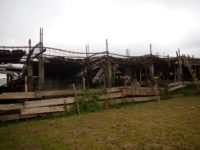 A five-day technical training workshop for 30 beekeepers from both Nkoranza Municipality and Nkoranza North District held at Nkoranza ended at the weekend.
A five-day technical training workshop for 30 beekeepers from both Nkoranza Municipality and Nkoranza North District held at Nkoranza ended at the weekend.
It educated participants on the effective way of keeping bees and harvesting for better preservation.
The workshop was organized by Programma Uitzending Managers (PUM), a Netherlands Senior Experts Group, experienced in Agriculture and Horticulture and other business activities.
Mr. Imker Wouter Schowstra, a Senior Expert of PUM who addressed the participants announced his group had decided to provide honey processing equipment to the farmers to enable them produce quality honey to meet international standards.
He advised the farmers to keep their beehives in cashew farms, stressing that bees promoted the production of cashew-nuts and much honey.
Mr. Richard Okoe, President of the Ghana National Beekeepers Association (GNAB) called on the Government to set up an institution to promote bee-keeping in the country since honey is used for various purposes.
Mr. Okoe stressed the need for the unemployed youth of the area to go into beekeeping saying the venture “is a viable business that would enable you to improve upon your livelihood”.
He expressed gratitude to the Netherlands Senior Experts for visiting the country in general and Nkoranza in particular to support the activities of bee-keepers, recalling that “this year is the second period Mr. Schowastra has come to Nkoranza to encourage the farmers in their activities”.
Mr. Michael Sarpong, Chairman of the Nkoranza Municipal Bee-keepers Association advised the participants to keep their honey in decent containers to make their produce last longer.
Mr. Sarpong noted it was an acceptable fact that honey from Nkoranza had been identified as of quality value and urged the farmers to do well to maintain the record.
He mentioned incidents of bushfires and the application of insecticides in farms as major challenges facing beekeepers and called on the members to visit their farms regularly during the dry season to protect their beehives from destruction by bushfires.





